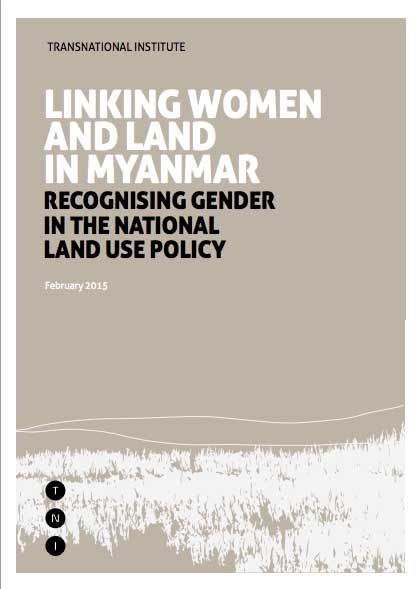Linking Women and Land in Myanmar: Recognising Gender in the National Land Use Policy
By Transnational Institute • February 17, 2015 The draft National Land Use Policy (NLUP) that was unveiled for public comment in October 2014 intends to create a clear national framework for managing land in Myanmar1. This is a very important step for Myanmar, given the fundamental importance of land policy for any society – particularly those with recent and complex histories of political and armed conflict and protracted displaced populations. With 70% of Myanmar’s population living and working in rural areas, agriculture is a fundamental part of the country’s social and economic fabric. The majority of these are small-holder farmers, whose land rights are currently under threat. The situation is particularly dire for the country’s ethnic minority groups, who make up an estimated 30% of the population.
The draft National Land Use Policy (NLUP) that was unveiled for public comment in October 2014 intends to create a clear national framework for managing land in Myanmar1. This is a very important step for Myanmar, given the fundamental importance of land policy for any society – particularly those with recent and complex histories of political and armed conflict and protracted displaced populations. With 70% of Myanmar’s population living and working in rural areas, agriculture is a fundamental part of the country’s social and economic fabric. The majority of these are small-holder farmers, whose land rights are currently under threat. The situation is particularly dire for the country’s ethnic minority groups, who make up an estimated 30% of the population.
Establishing an inclusive land use policy-making process that allows for – and encourages – full and meaningful participation for all rural working people is essential for ensuring a policy outcome that is widely and effectively accepted by society.
The land use policy draft under discussion here has a national scope, and will likely have a long-term impact. Therefore it is of crucial importance to the future prospects and trajectories of agriculture and the lives of those engaged in the sector, with impacts not only upon how land is used, but also upon who will use it, under what conditions, for how long and with what purposes. Ensuring that all members of Myanmar’s rural communities are considered in the making of the policy, so that their needs are represented and their rights are upheld, is critical to its legitimacy and efficacy in providing a basis for democratic access and control over land and associated resources.
This policy brief will focus upon the potential gender implications of the current policy draft and offer some suggestions as to how it might be improved to promote and strengthen women’s land rights within the Myanmar context.
Tags: Transnational InstituteThis post is in: Ethnic Nationalities, Human Rights, Women
Related PostsChina’s Engagement in Myanmar: From Malacca Dilemma to Transition Dilemma
The right to land at crossroads in Myanmar
The Meaning of Land in Myanmar
No Women, No Peace: Gender Equality, Conflict and Peace in Myanmar
The 2015 General Election in Myanmar: What Now for Ethnic Politics?









 All posts
All posts